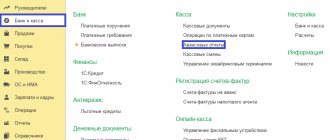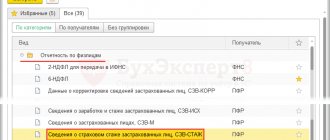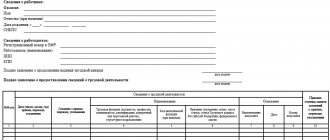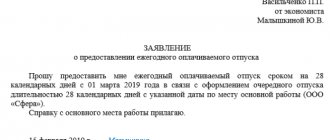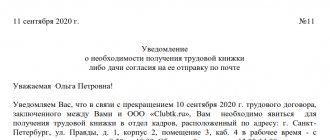The employer's obligation to organize medical examinations of employees
The current provisions of the regulations establish the employer’s obligation to carry out medical examinations of its employees. The company administration must organize medical examinations at its own expense.
Moreover, this rule applies to preliminary, periodic and extraordinary medical examinations. While employees undergo a medical examination, their jobs are retained and average earnings are paid.
Preliminary inspection is carried out only in relation to persons applying for work; periodic inspection must be carried out in cases determined by the norms of legislation and the carried out special assessment and assessment system.
Extraordinary ones are carried out either on the initiative of the administration or the employee himself, if it is clear that due to health reasons he cannot cope with his work responsibilities. Indications for conducting a medical examination are also established at the legislative level.
Attention! Labor law standards establish the obligation of an employee to undergo medical examinations in specified cases. If the employer ignores this obligation, administrative measures may be taken against him.
Legal requirements
The Labor Code of the Russian Federation, namely Article 212, states that the responsibility for conducting a medical examination of workers lies with the employer. That is, the medical examination must be carried out exclusively at the expense of the employing company. The same document (Article 213 and 348.3) also mentions those professions for whose representatives periodic examination is mandatory. This group includes:
- Persons working in hazardous and hazardous industries. The list of hazardous work, as well as types of activities harmful to health, is established by the Order of the Ministry of Health and Social Development.
- Employees of food enterprises.
- Medical workers.
- Employees of educational institutions.
- Drivers.
- People working in industries related to machinery.
- Other specialties included in the list established by law.
If an employee fails to comply with this requirement, the employee who has not undergone a periodic medical examination, of course, does not face dismissal. But this will give the employer a reason to record a disciplinary violation. And it can already lead to the cancellation of the employment contract.
In addition, there are legislative provisions on passing a medical examination for persons who are just applying for a job. Issuing referrals for examination is the responsibility of the employer. It is mandatory to undergo a medical examination:
- Minor applicants (under 18 years of age).
- Persons seeking employment in the regions of the Far North (Article 324 of the Labor Code of the Russian Federation).
- Shift workers (Article 298 of the Labor Code of the Russian Federation).
- Athletes.
- Workers whose activities will be related to driving vehicles (air, water or land).
- Persons engaged in underground work (Article 330.3 of the Labor Code of the Russian Federation).
- To the security guards.
- Employees who spend more than half of their working time at a computer monitor (clause 13.3 of SANPIN 2.2.2/2.4.1340−03).
Medical opinions can be issued only by those medical institutions and organizations that have a license to carry out this activity.
Who is required to undergo a medical examination?
The list of persons for whom a medical examination is mandatory is determined by labor standards:
- Employees, if they are under 18 years of age.
- Employees whose workplace, according to the carried out special safety regulations, is exposed to hazardous and harmful factors.
- Workers in the food industry, catering organizations, direct trade enterprises.
- Employees who work on a rotational basis.
- Enterprise employees whose workplaces are underground.
- An employee of companies whose activities are carried out in the territories of the Far North and equivalent regions.
- Private security workers.
- Professional athletes.
- Employees of educational institutions.
- Workers associated with the transport department.
Attention! Russian legislation may expand this list of persons.
Who should be examined
List of persons for whom medical examinations are a mandatory procedure:
- If the employee is under 18 years of age;
- If, based on the results of the special operational assessment, it is revealed that the employee’s place of work is exposed to aggressive and dangerous factors;
- Workers who handle food products and are involved in sales;
- People who work on shifts;
- Workers who perform their labor functions underground;
- Employees who perform duties in the Far North;
- Non-departmental security workers;
- Professional level athletes;
- Citizens working in the field of education;
- Workers who manage transport.
Timing and frequency of medical examination
A medical examination is a set of procedures aimed at identifying an employee’s occupational diseases and preventing the risk of their development. It is carried out in specialized medical institutions.
For each profession, the period and frequency of undergoing a medical examination are established.
The following types of medical examinations can be distinguished:
- Preliminary - carried out in relation to certain categories of employees at the time of their entry to work.
- Periodic - carried out at certain intervals in accordance with SOUTH regulations, legal norms, etc. For each profession, the frequency of sending an employee for medical examinations is established. In this case, the frequency of medical examinations can be established by law from one to four times a year. For example, catering workers must undergo a medical examination once a year, workers whose workplace is underground - once a year, personnel caring for the elderly and young - 4 times a year, etc. Factors affecting the employee’s workplace also influence; for them, the frequency is established by the SOUT.
- Pre-trip and post-trip medical examination is carried out in relation to transport workers due to the fact that the life and health of not only them, but also those around them depends on their health. Provided before they go on shift and after it. Therefore, they are carried out daily.
- Extraordinary - carried out at the initiative of the employee or employer.
Attention! The frequency of the examination determines the period when the employee should be sent for a medical examination.
Types of medical examinations
The most basic reason for the appearance of such a requirement is the timely detection of the onset of the development of occupational diseases (for a number of specialties this point is very important). In addition, the employer needs to know to what extent the person’s health allows him to perform certain duties: whether the citizen has mental disabilities, contraindications to performing certain activities, etc. Depending on this, there are several types of examinations:
- Preventive - necessary in order to identify the onset of development of pathological diseases in the early stages and, if such a need arises, to stop the deviation in time.
- Preliminary - carried out when the applicant finds employment or enrolls in studies (university, school).
- Regular - carried out at certain intervals in order to monitor the health status of employees.
- Pre-trip (or pre-shift) - carried out before a person has to start work. This type of inspection is most in demand in organizations that provide transportation services (passengers and cargo), construction, and others. This is done in order to prevent employees with poor health from coming to work - for example, with low or high blood pressure, dizziness, since these symptoms will reduce the reaction rate, which can lead to negative consequences not only for the employee himself, but also for those around him. It also identifies those people who decide to show up at work while intoxicated.
- Post-shift (post-trip) - carried out at the end of the working day (shift, watch). Necessary in order to control the effects of harmful factors on the body, if any.
- Other types of inspections provided for by law.
The employee does not have the opportunity to refuse to carry out these examinations, if they are specified in the employment agreement: this will be considered a disciplinary violation, which may be followed by dismissal (failure to undergo a medical examination is considered non-compliance with the employment contract).
What to do if an employee does not pass a medical examination?
Procedure for dismissal from work
First of all, it is necessary to document the occurrence of a fact that allows the employee to be removed.
You might be interested in:
An employment contract with an employee: what it should contain, the procedure for concluding, a standard form
This can be done by drawing up one of the documents:
- Explanatory note about failure to undergo a medical examination;
- Refusal in writing to undergo inspection;
- Sick leave opened during the period of medical examination;
- Act on evading medical examination;
- Memo from the manager or responsible person;
- etc.
Drawing up an order
Based on the available supporting documents, a removal order is issued. There is no special form for it, so it is usually compiled randomly on company letterhead.
The supporting document for the order is a document confirming the fact that the employee refused a medical examination. For example, a record of the issuance of a referral for a medical examination.
The document must reflect the reasons for the suspension and the duration of this action. You can specify the standard phrase “until the circumstances that served as the basis for removal are eliminated.” At that time, if it is possible to indicate a specific date, then it should be indicated.
Attention! The order must reflect the procedure for remuneration for the specified days. Thus, the salary for this period is not accrued to the employee unless the employee was unable to pass the examination for a good reason.
Employee Notification
To confirm the fact that the employee has been notified of the reasons for his removal from work duties, he must be given a written notice. This document is drawn up in free form, usually using letterhead.
The notice must reflect:
- Full name and position of the employee;
- Information about the need to undergo periodic medical examination;
- The date from which the employee will be suspended if he does not pass;
- Indication of deprivation of wages for the period of suspension from work.
At the bottom of the form, there must be a field in which the employee will put a date and signature to confirm receipt.
If the employee refuses to receive the notice or sign for it, then it is necessary to assemble a commission and, in its presence, read the text of the notice to the employee. Next, a refusal act is drawn up, which is stored along with the notification form.
Liability in case of violation of instructions
The obligation to comply with this requirement lies with both the employer and the employee. In case of violation, the first ones face a fine, and the second ones face a disciplinary reprimand, in which all regulations specified in Article 193 of the Labor Code of the Russian Federation must be observed. If after the first punishment the employee still does not pass the medical examination, then he may be dismissed from work (grounds - Article 81, paragraph 5, part 1 of the Labor Code of the Russian Federation). That is, such a measure for him will only be a matter of time.
Sanctions applied to the employer
It is the responsibility of the head of the company not to allow those persons who have not passed a medical examination to perform their official duties. The basis is Article 212, paragraph 12 of the Labor Code of the Russian Federation. If a person is just getting hired by a company, then the employer does not have the opportunity to hire this employee. That is, the applicant will be denied the vacancy.
If an employee who has not passed the examination is already on staff, the employer is obliged to remove him from professional duties (Article 76 of the Labor Code of Russia). The same must be done in the case where the applicant (employee) has medical contraindications to work.
If this rule is not observed, the employer may be subject to administrative punishment in the form of a fine. Grounds - part 3, article 5.27.1 of the Code of Administrative Offenses of Russia. The amount of the penalty will be:
- For private entrepreneurs - 15-25 thousand rubles. In case of repeated violation, the amount will increase many times and become equal to 30-40 thousand rubles (Part 5, Article 5.27.1 of the Code of Administrative Offenses of the Russian Federation).
- Officials may be charged 15-20 thousand rubles or 30-40 thousand rubles if the order was violated a second time.
- For organizations, the amount of the fine will range from 110-130 thousand rubles to 200 thousand rubles (repeated fine).
Alternatively, a penalty may be imposed in the form of disqualification for a period of 1-3 years (officials) or suspension of activities for 3 months (private entrepreneurs and organizations).
In addition, for failure to comply with labor safety rules, criminal liability may be applied to the management of the company under Article 143 of the Criminal Code of the Russian Federation. Then the punishment will be like this:
- A fine from 5 to 400 thousand rubles is collected in cash or calculated as the income of the convicted person for a period of 2 to 18 months.
- Forced labor of varying durations.
- Deprivation of liberty.
- Other measures established by law.
Therefore, the employer will strictly ensure that all company personnel comply with the requirement to undergo a mandatory medical examination.
Removing an employee from work
If a subordinate refuses to undergo a mandatory medical examination, the employer has every right to remove this person from work. During the period of suspension, the employee will not be paid. The basis is Article 76, Part 3 of the Labor Code of Russia. For such a measure of influence on the violator to be legal, the employer must have facts confirming this circumstance. What will be taken into account:
- An explanatory note stating that the medical examination was not passed.
- Refusal to undergo a medical examination, written personally by the employee.
- Sick leave covering the dates allocated for the examination.
- Information received from a medical institution confirming a person’s failure to appear for a medical examination.
- Certificate of refusal to undergo a medical examination (written by the employer).
After these documents (one of them) are submitted, the employer issues an order to remove the employee from performing work. The order states the following:
- FULL NAME. subordinate, his position.
- The reason that served as the basis for drawing up the order indicating references to legislation (Article 76, part 1 of the Labor Code of Russia).
- The period for which the document will be valid. In some organizations, where management is more loyal, the period of suspension may be indicated not by a specific date, but by an event (passing an inspection).
- Circumstances (if any) that will confirm that the specialist is not at fault for not doing the medical examination on time.
- Conditions of remuneration for the period of suspension (in the event that non-compliance with the order was not the fault of the employee).
- List of documents confirming the fact of violation by the employee of labor protection requirements.
- Signatures of the parties: employer and employee.
If after this the employee ignores management’s claims, the employer may reprimand him.
Dismissal of a subordinate
In the event that the manager nevertheless decides to impose disciplinary punishment on the employee for not passing the medical examination at work on time, dismissal may become a reality. This is especially true for those specialists who have already “distinguished themselves” in terms of violation of labor discipline:
- The employee has already been subject to disciplinary action within a year (Article 194, Part 1 of the Labor Code of Russia).
- The reason why the employee did not do the medical examination on time was not valid.
If all these elements are present, the employer has the right to cancel the employment agreement with the subordinate under Article 81, Part 1, Clause 5 of the Labor Code of the Russian Federation. The reason that will be indicated in the dismissal order will be the employee’s repeated failure to perform his professional functions without good reason.
Grounds for dismissal of an employee who has not passed a medical examination
If an employee is suspended from work due to failure to undergo a periodic medical examination, and after a certain time the employer still does not have a medical examination report in hand, then the employee can be dismissed on the initiative of the employer in accordance with clause 5 of part 1 of Art. 81 of the Labor Code of the Russian Federation (repeated failure to fulfill labor duties without good reason)
You might be interested in:
Dismissal due to staff or headcount reduction: step-by-step instructions with documents
If, based on the results of the inspection, the employee received a negative conclusion, and the employer does not have a suitable place for him, then the employment agreement is terminated at the initiative of the employer under clause 8 of part 1 of Art. 77 of the Labor Code of the Russian Federation (refusal to transfer to another job necessary due to a medical report).
Attention! If, based on the results of a medical examination, the employee was diagnosed with a disability, as a result of which he was declared completely unfit to perform labor duties, then his dismissal is carried out at the initiative of the employer in accordance with clause 5 of part 1 of Art. 83 of the Labor Code of the Russian Federation (recognition as completely incapable of working according to a medical report).
What should an employee who has not passed a medical examination do?
It so happened that an employee did not pass a medical examination at work, what should he do? In practice, there may be two options for the development of the situation.
The employee did not show up for a medical examination
The employee was warned by the employer that he needed to undergo a periodic medical examination, and the warning was provided in writing. On the appointed day, the employee did not show up for inspection. The employer drew up a report to record the fact of non-appearance.
Next, the employee needs to provide evidence that he did not come for valid reasons, and will be able to undergo examination at the first opportunity.
Attention! If he cannot do this, he is subject to disciplinary punishment (reprimand, reprimand, etc.). Until the inspection is completed, the employee will be suspended from work without pay.
Medical examination showed the employee's unfitness
If it is determined that the employee cannot perform this work for medical reasons, he can immediately write a statement requesting his transfer to another place that will be suitable for him. If it exists, the employer is obliged to transfer the employee according to the Labor Code.
The transfer can be temporary (up to 4 months) or permanent. If the employee does not agree to the transfer, then if the transfer is temporary, the administration suspends him from work for a given period; if the transfer is permanent, unilateral dismissal may occur. Upon dismissal, the employee receives compensation payments.
Attention! Thus, if an employee has not passed a medical examination and is not fit for further work in his place, then he can either agree to a transfer (if the employer has the opportunity), or resign under the article and look for another place of work where this disease will not be an issue. obstacle.
Permission to perform official duties
If, within the prescribed period, the employee who was at fault still undergoes a medical examination, he will be reinstated at work. The basis is Article 76, Part 2 of the Labor Code of the Russian Federation. Passing a medical examination must be confirmed by a document - a conclusion on the state of health. It is issued by a medical institution (clause 31 of the Procedure for conducting medical examinations).
Permission to perform official duties is issued by a separate order. This is necessary because this document will be able to record the end of the period of suspension. The paper is drawn up in any form, but at the same time it must indicate the following information:
- Information about the employee: Full name, position.
- The date from which the subordinate must begin performing his duties.
- Reason for previous suspension from work.
- An order addressed to the accounting department with the requirement to resume calculating wages to the employee.
- Details of the medical document.
- Signatures of the parties: the head of the enterprise and the subordinate.
It is better not to hold out until the moment when the employer is simply forced to suspend cooperation, or even stop it altogether. After all, no matter how loyal management is to its subordinates, not a single manager will pay large fines for careless personnel. Therefore, you should not test the employer’s patience. It would be much wiser to comply in a timely manner with the legal requirement for mandatory medical examination.





